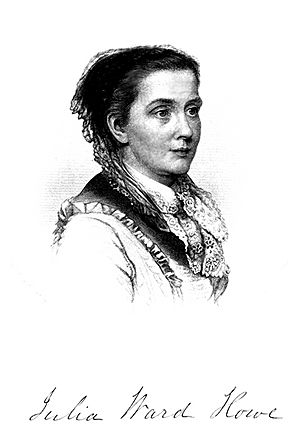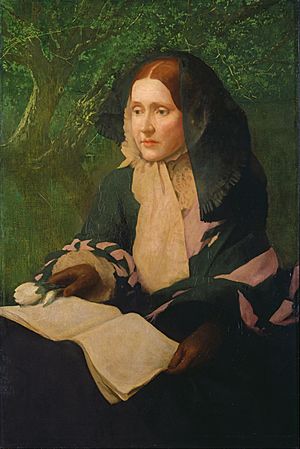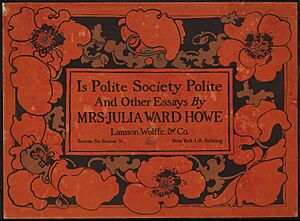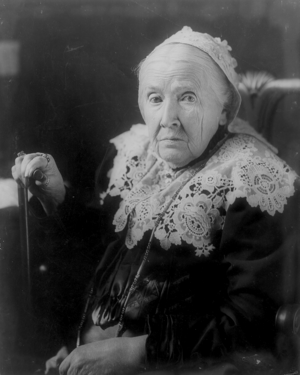Julia Ward Howe facts for kids
Quick facts for kids
Julia Ward Howe
|
|
|---|---|
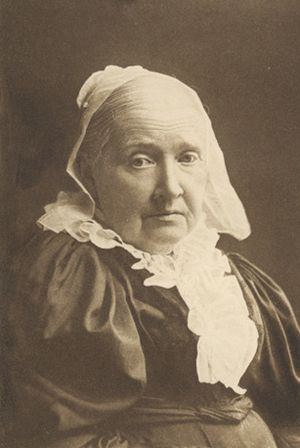 |
|
| Born | Julia Ward May 27, 1819 New York City, U.S. |
| Died | October 17, 1910 (aged 91) Portsmouth, Rhode Island, U.S. |
| Spouse | |
| Children | |
| Parents | Samuel Ward III Julia Rush Cutler |
| Relatives | Samuel Cutler Ward (brother) |
| Signature | |
Julia Ward Howe (born May 27, 1819 – died October 17, 1910) was an American writer and poet. She is famous for writing "Battle Hymn of the Republic". This song became very popular during the American Civil War. She also wrote the first Mother's Day Proclamation in 1870. This message asked women to work for peace. Julia Ward Howe was also a strong supporter of ending slavery. She worked hard for women's suffrage, which means women's right to vote.
Contents
Early Life and Education
Julia Ward was born in New York City. She was one of seven children. Her father, Samuel Ward III, was a successful banker. He was also a very strict Episcopalian. Her mother, Julia Rush Cutler Ward, was a poet. Sadly, her mother died when Julia was only five years old.
Julia was taught at home by private tutors. She also attended schools for young ladies. This continued until she was sixteen. Her older brother, Samuel Cutler Ward, traveled in Europe. He brought home many interesting books. Julia read these books and learned a lot. She met famous people like Charles Dickens and Margaret Fuller. This was because her father was a well-known banker.
Personal Life
Julia was raised in the Episcopalian church. But by 1841, she became a Unitarian. In Boston, she met Samuel Gridley Howe. He was a doctor and a reformer. He had started the Perkins School for the Blind. In 1843, Julia and Samuel got married. He was eighteen years older than her.
They had six children together. Their names were Julia, Florence, Henry, Laura, Maud, and Samuel Jr. Julia raised her children in South Boston. Her husband was often busy with his reform work. Julia sometimes hid her unhappiness about their marriage. Her children even called her "the family champagne." She often visited "The Yellow House" in Gardiner, Maine. This was a home that later belonged to her daughter Laura.
In 1852, the Howes bought a country home. It was called "Oak Glen" in Portsmouth, Rhode Island. They also kept homes in Boston and Newport. They spent several months each year at Oak Glen.
Career and Activism
Writing and Ideas
Julia Ward Howe loved to learn. She went to lectures and studied different languages. She also wrote plays and essays. Her first book of poems, Passion-Flowers, came out in 1853. She published it without her husband knowing. Her second book of poems, Words for the Hour, was published in 1857. She also wrote plays like Leonora. These writings often talked about women's roles and her own marriage.
In 1860, she published A Trip to Cuba. This book described her trip in 1859. Her husband did not like her writing. He tried to stop her creative work. After he died in 1876, Julia found that much of her money was gone. This was due to bad investments. Julia's writing and activism were greatly shaped by her life experiences.
Working for Change
Julia Ward Howe was inspired to write "The Battle Hymn of the Republic". This happened after she visited Washington, D.C., in November 1861. She met President Abraham Lincoln at the White House. A friend suggested she write new words to the song "John Brown's Body". She wrote the famous words on November 19. The song was published in February 1862. It quickly became a very popular song for the Union soldiers during the American Civil War.
After the war, Julia focused on peace and women's rights. By 1868, her husband no longer opposed her public work. She helped start the New England Women's Club. She also helped found the New England Woman Suffrage Association. She was president of this group for nine years. In 1869, she became a leader of the American Woman Suffrage Association.
In 1872, she became the editor of Woman's Journal. This was a popular magazine that supported women's right to vote. She wrote for it for twenty years. That same year, she wrote her "Appeal to womanhood throughout the world". This is now known as the Mother's Day Proclamation. It asked women everywhere to work together for world peace. She wanted "Mothers' Day" to be celebrated on June 2nd. Her idea for a special day for mothers was not successful at first.
Julia continued to be active in many groups. In 1881, she was elected president of the Association for the Advancement of Women. She also helped found the General Federation of Women's Clubs in 1890. She spoke at the 1893 World's Parliament of Religions in Chicago. In 1908, Julia Ward Howe became the first woman elected to the American Academy of Arts and Letters. This group supports excellence in American literature, music, and art. She continued to write until her death.
Death and Legacy
Julia Ward Howe died on October 17, 1910. She was 91 years old. She passed away at her home, Oak Glen, in Portsmouth. She is buried in the Mount Auburn Cemetery in Cambridge, Massachusetts. At her memorial service, about 4,000 people sang "Battle Hymn of the Republic." This was a sign of respect for her.
After her death, her children wrote a book about her life. It was published in 1916. This book won the Pulitzer Prize for Biography. In 1987, the U.S. Postal Service honored her with a postage stamp.
Several places are named after her:
- The Julia Ward Howe School of Excellence in Chicago.
- The Howe neighborhood in Minneapolis, Minnesota.
- The Julia Ward Howe Academics Plus Elementary School in Philadelphia.
- Her Rhode Island home, Oak Glen, is a historic place.
- Her Boston home is part of the Boston Women's Heritage Trail.
Awards and Honors
- January 28, 1908: She became the first woman elected to the American Academy of Arts and Letters.
- 1970: She was inducted into the Songwriters Hall of Fame.
- 1998: She was inducted into the National Women's Hall of Fame.
Selected Works
Poetry
- Passion-Flowers (1854)
- Words for the Hour (1857)
- Later Lyrics (1866)
- From Sunset Ridge: Poems Old and New (1898)
- At Sunset (published after her death, 1910)
Other Works
- From the Oak to the Olive (travel writing, 1868)
- Modern Society (essays, 1881)
- Margaret Fuller (Marchesa Ossoli) (biography, 1883)
- Woman's work in America (1891)
- Is Polite Society Polite? (essays, 1895)
- Reminiscences: 1819–1899 (autobiography, 1899)
See also
 In Spanish: Julia Ward Howe para niños
In Spanish: Julia Ward Howe para niños
- List of peace activists
- List of suffragists and suffragettes
- List of women's rights activists
- Timeline of women's suffrage
- Ann Jarvis
- Gardiner, Maine, Howe's home for many years
- Samuel Gridley and Julia Ward Howe House
 | Mary Eliza Mahoney |
 | Susie King Taylor |
 | Ida Gray |
 | Eliza Ann Grier |


